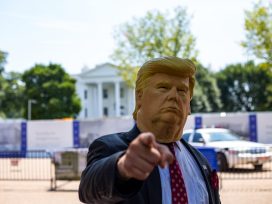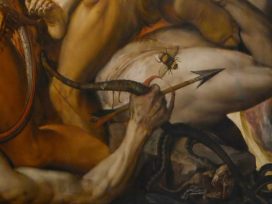
Trump returns to the White House at a time when the global stakes are higher than ever. What can be expected from his unpredictable foreign policy, and what does this mean for international solidarity, geopolitical stability and democratic values?
The western political representatives who met Putin in Moscow on 9 May to celebrate the sixtieth anniversary of the end of World War II were confronted by a version of history very different from their own. The event highlighted the way in which the comfortable historical consensus long obtained within and among western European countries has been undermined after the eastern enlargement. For Russia, this will mean breaking the taboo surrounding the Great Victory if relations with its neighbours are to be harmonious.
Throughout Europe, history is ceasing to be something for historians alone. Instead, it is becoming both a public issue and an instrument of politics. In the West, this progression can be traced from the wilful amnesia of the postwar years, through the mission of the ’68 generation to make the previous generation accountable for its crimes, to the obsession with history of the last two decades.1 In the East, the imposed history of the liberation has given way to the liberation of history (and histories). Nevertheless, highly different “commemorative cultures” have formed, which culminated and collided in dramatic form at the celebrations of the sixtieth anniversary of the end of World War II in Moscow.
Eurozine’s Focal Point “European Histories” takes as its premise the exemplary character of this commemoration ceremony for the future of the new Europe. We present extracts from a debate in the process of transcending national boundaries of historiography and commemorative practice.
More often than not, commemoration ceremonies pale over the course of time, until they are consigned to the archives or overwritten by new narratives. But the anniversary celebrations of the end of World War II on 8 and 9 May demonstrated a contrary dynamic: apparently, sixty years later, the event has never been so important. How to explain this phenomenon?
For decades, the date has been a touchstone in the dominant victory narratives and foundation myths of the European postwar societies. For the countries involved, it represented both a rupture and a new start; for the US and the Soviet Union, it acted as a source of legitimacy for the competing hegemonic claims that gave rise to the Cold War.
The collapse of the Soviet Union, and the polarized world order it propped up, radically questioned the pat interpretations, in both western and eastern Europe, of the wartime and postwar periods. Now, after EU enlargement, it has become necessary to re-evaluate the “Year Zero”. Today, we have “as many wars as nations”;2 at the same time, commemorative practice has become internationalized, as Andreas Langenohl proposes in his article “State Visits”.
The experience of World War II was constitutive for the development of the European Union. Former arch-enemies had to be embraced into a community of mutual interests in order to render another war impossible. The success of the community was based on consent to the division of Europe, with the consequence that the other half of the continent was written off, and, with the blessing of democracy, peace, and economic upturn, kept out. It was only with the unexpected collapse of the Soviet empire that eastern Europe re-entered the European Union’s expanded political horizon. In May 2004, after long negotiations, another eight countries in the region could be admitted.
The comfortable historical consensus long obtained within and among western European countries was undermined after the eastern enlargement. As Timothy Snyder explains, the reason was that 1945 has an entirely different meaning “for most citizens of the states admitted to the Union in May 2004. For them, 1945 means a transition from one occupation to another, from Nazi rule to Soviet rule.”
From their side, the significance of the date is not unambiguous. In most former satellite states and Soviet Republics, the collapse of the official doctrine sparked off a heated controversy about the interpretation of their own histories. To take the Baltic states as an example: what from one point of view was collaboration, was from another view resistance. The outcome of this still wide open debate will be decisive in forming new identities.
As Snyder argues, a precondition for the solidarity of the extended EU will be the development of a historical consciousness that accommodates the new members appropriately, and involves them in the wider debate. Today, what is clearly absent is a comprehensive twentieth-century European history. On this point, the Union continues to be divided, while many of the new member-states are still internally at odds.
Russia was the main victor in World War II, and the main loser in 1989. In hanging on to the myth of the Great Patriotic War – the last achievement of the Soviet Union not to have been discredited – it seeks to perpetuate a world order established at Yalta. Doing so allows it to maintain its claims upon the region. Lev Gudkov describes this myth, which, above and beyond its function in foreign policy, provides a source of national confidence and legitimates “the repressive character of the centralist social order”.
Many of the high-ranking western political representatives who met Putin to celebrate the Great Victory were confronted with a version of history that could hardly be reconciled with their own perspectives. Putin’s rhetoric when he visited Auschwitz in January 2005 made clear his wish to resuscitate the Soviet myth and place it in a historical continuum with imperial Russian history and the global war against terrorism. The event in Moscow also followed this programme.
“Even today there exists a taboo on exploring the underside of victory”, writes Gudkov. Apparently there is some way to go before the Russian portrayal of World War II and its consequences can be reconciled with that of its neighbours, whether they are seen to be liberated or occupied.
Europeans are still far from an all-embracing “grand narrative” of World War II – assuming this is worth striving for at all. Much would have already been gained if existing plurality of narratives could be put up for discussion in a communal space transcending national boundaries.
Eurozine’s Focal Point “European Histories” addresses itself to this task. Benchmark essays published here appear simultaneously in a co-edition published by the Russian magazine NZ and the German journal Osteuropa, entitled “Gulfs of memory. Russia and Germany sixty years after the war”. Also relevant in this respect are Adam Kreminski’s instructive article “As many wars as nations” in Polytika, translated into English in signandsight, and into German in Perlentaucher, or the Neue Zürcher Zeitung’s dossier on “May 1945 – an end with consequences” (30 April).
Aleida Assmann/Ute Frevert, Geschichtsvergessenheit - Geschichtsversessenheit. Vom Umgang mit deutschen Vergangenheiten nach 1945, Stuttgart 1999. See also Ute Frevert, "Geschichtsvergessenheit und Geschichtsversessenheit revisited. Der jüngste Erinnerungsboom in der Kritik". In: Aus Politik und Zeitgeschichte (B 40-41/2003), also www.bpb.de/files/HEKVE4.pdf. See also Pierre Nora, "Reasons for the current upsurge in memory". See also related articles in Transit, 22, "The memory of the century".
Adam Krzeminski, "As many wars as nations".
Published 3 May 2005
Original in German
© Eurozine
PDF/PRINTSubscribe to know what’s worth thinking about.

Trump returns to the White House at a time when the global stakes are higher than ever. What can be expected from his unpredictable foreign policy, and what does this mean for international solidarity, geopolitical stability and democratic values?

The difference between knowing from distance that war is being waged and living that reality couldn’t be more extreme. But can awareness of multiple repercussions turn protective disassociation from violence into active solidarity? ‘The Most Documented War’ symposium in Lviv, Ukraine, provides valuable pointers regarding engagement and responsibility.